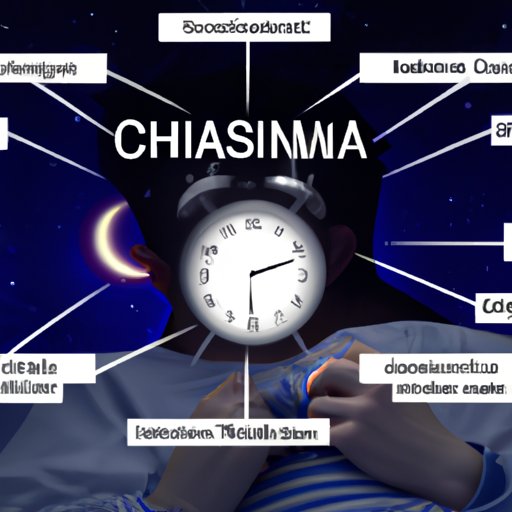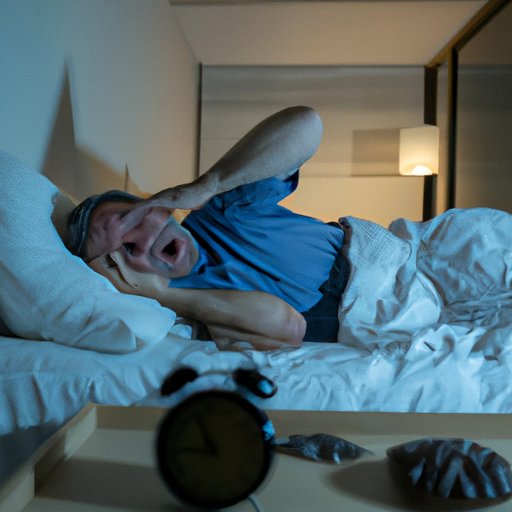Introduction
Insomnia is a common problem that affects millions of people around the world. It is defined as difficulty falling asleep or staying asleep, resulting in inadequate or non-restorative sleep. The effects of not sleeping can be far-reaching, from physical health issues to mental health problems, so it’s important to understand what causes insomnia and what can be done to address it.
Explore the Effects of Not Getting Enough Sleep
Sleep deprivation can have a wide range of negative effects on physical and mental health. A lack of sleep can lead to fatigue, irritability, and difficulty concentrating. It can also increase the risk of developing chronic illnesses such as heart disease, diabetes, and depression. Here are some of the most common effects of not getting enough sleep:
Physical Health Effects
Not getting enough sleep can lead to a weakened immune system and an increased risk of developing certain illnesses. Studies have shown that people who don’t get enough sleep are more likely to develop high blood pressure, stroke, and cardiovascular disease. Additionally, lack of sleep can lead to weight gain, as it disrupts the hormones that regulate hunger.
Mental Health Effects
Lack of sleep can also have an effect on mental health. Studies have linked sleep deprivation to depression, anxiety, and other mood disorders. It can also lead to cognitive impairment, including difficulty focusing and concentrating, difficulty remembering things, and impaired decision-making skills.

Examine the Causes of Chronic Insomnia
There are many potential causes of chronic insomnia, including stress, poor diet, environment, and medical conditions. Here are some of the most common causes of insomnia:
Stress
Stress is one of the most common causes of insomnia. Stressful events such as job changes, relationship problems, or financial worries can disrupt the body’s natural sleep cycle, making it difficult to fall asleep and stay asleep.
Poor Diet
A poor diet can also contribute to insomnia. Eating too much sugar, processed foods, and caffeine can interfere with the body’s ability to relax and fall asleep.
Environment
The environment can also play a role in insomnia. Too much noise or light can make it difficult to fall asleep, while a bedroom that is too hot or cold can also disrupt sleep.
Medical Conditions
Certain medical conditions can also cause insomnia, such as asthma, allergies, and thyroid problems. Medications such as antidepressants and stimulants can also interfere with sleep.

Analyze How Stress Contributes to Sleep Deprivation
Stress is one of the most common causes of insomnia, and it can have a profound effect on both the body and mind. When we are stressed, our bodies produce cortisol, which is a hormone that can interfere with sleep. Additionally, stress can lead to racing thoughts and worry, making it difficult to relax and fall asleep.
Effects on Body and Mind
Stress has a wide range of effects on both the body and mind. On the physical level, it can lead to headaches, muscle tension, and digestive issues. On the mental level, it can lead to difficulty concentrating, difficulty making decisions, and difficulty managing emotions.
Causes of Stress
There are many potential causes of stress, including work, family, relationships, financial worries, and daily life. It’s important to identify the source of your stress so you can take steps to address it.
Coping Strategies
Once you have identified the source of your stress, it’s important to find ways to cope with it. Some coping strategies include exercise, yoga, meditation, journaling, and talking to a friend or professional. It’s important to find activities that help you relax and manage your stress levels.

Evaluate How Not Sleeping Affects Physical and Mental Health
Not getting enough sleep can have a significant impact on both physical and mental health. Here are some of the most common effects:
Cognitive Impairment
Studies have shown that lack of sleep can lead to cognitive impairment, including difficulty concentrating, difficulty remembering things, and impaired decision-making skills. It can also lead to slower reaction times and decreased creativity.
Cardiovascular Disease
Research has also linked lack of sleep to an increased risk of developing heart disease, stroke, and other cardiovascular diseases. People who don’t get enough sleep are at an increased risk of developing these conditions due to their high blood pressure and weakened immune system.
Depression
Lack of sleep can also lead to depression, as it interferes with the body’s ability to regulate mood. Studies have shown that people who don’t get enough sleep are more likely to suffer from depression, anxiety, and other mood disorders.
Discuss Natural Solutions for Better Sleep
There are many natural solutions that can help improve sleep quality. Here are some of the most effective solutions:
Exercise
Regular exercise can help improve sleep quality by reducing stress levels and promoting relaxation. Studies have shown that people who exercise regularly tend to fall asleep faster and stay asleep longer.
Healthy Diet
Eating a healthy diet can also help improve sleep quality. Avoiding processed foods and sugary snacks can help reduce stress levels and promote relaxation. Additionally, eating foods rich in magnesium, such as spinach and bananas, can help relax the body and prepare it for sleep.
Relaxation Techniques
Relaxation techniques such as deep breathing, progressive muscle relaxation, and guided imagery can help reduce stress levels and promote relaxation. Practicing these techniques before bed can help the body and mind relax and prepare for sleep.
Regular Bedtime Routine
Creating a regular bedtime routine can also help improve sleep quality. Going to bed and waking up at the same time every day can help the body establish a regular sleep schedule. Additionally, avoiding screens before bed and creating a dark, quiet environment can help the body and mind relax and prepare for sleep.
Review Common Medications Used to Treat Sleep Disorders
In some cases, medications may be used to treat sleep disorders. Here are some of the most common types of medications used to treat insomnia:
Types of Medication
Common medications used to treat sleep disorders include benzodiazepines, non-benzodiazepines, and antihistamines. These medications can help induce sleep, but they should only be taken under the supervision of a doctor.
Side Effects
These medications can have side effects such as drowsiness, dizziness, and confusion. Additionally, long-term use of these medications can lead to dependence and addiction, so they should only be used when absolutely necessary.
Alternatives
In some cases, alternative treatments such as acupuncture, massage, and herbal remedies may be used to treat sleep disorders. These treatments can be effective, but they should always be discussed with a doctor first.
Conclusion
Sleep deprivation can have serious effects on both physical and mental health. It can lead to fatigue, irritability, cognitive impairment, and an increased risk of developing chronic illnesses. The most common causes of insomnia are stress, poor diet, environment, and medical conditions. To treat insomnia, it’s important to identify the source of the problem and take steps to address it, such as exercising, eating a healthy diet, and practicing relaxation techniques. In some cases, medications may be used to treat sleep disorders, but they should always be used under the supervision of a doctor. By taking steps to address the root cause of insomnia, it is possible to improve sleep quality and overall health.
(Note: Is this article not meeting your expectations? Do you have knowledge or insights to share? Unlock new opportunities and expand your reach by joining our authors team. Click Registration to join us and share your expertise with our readers.)
